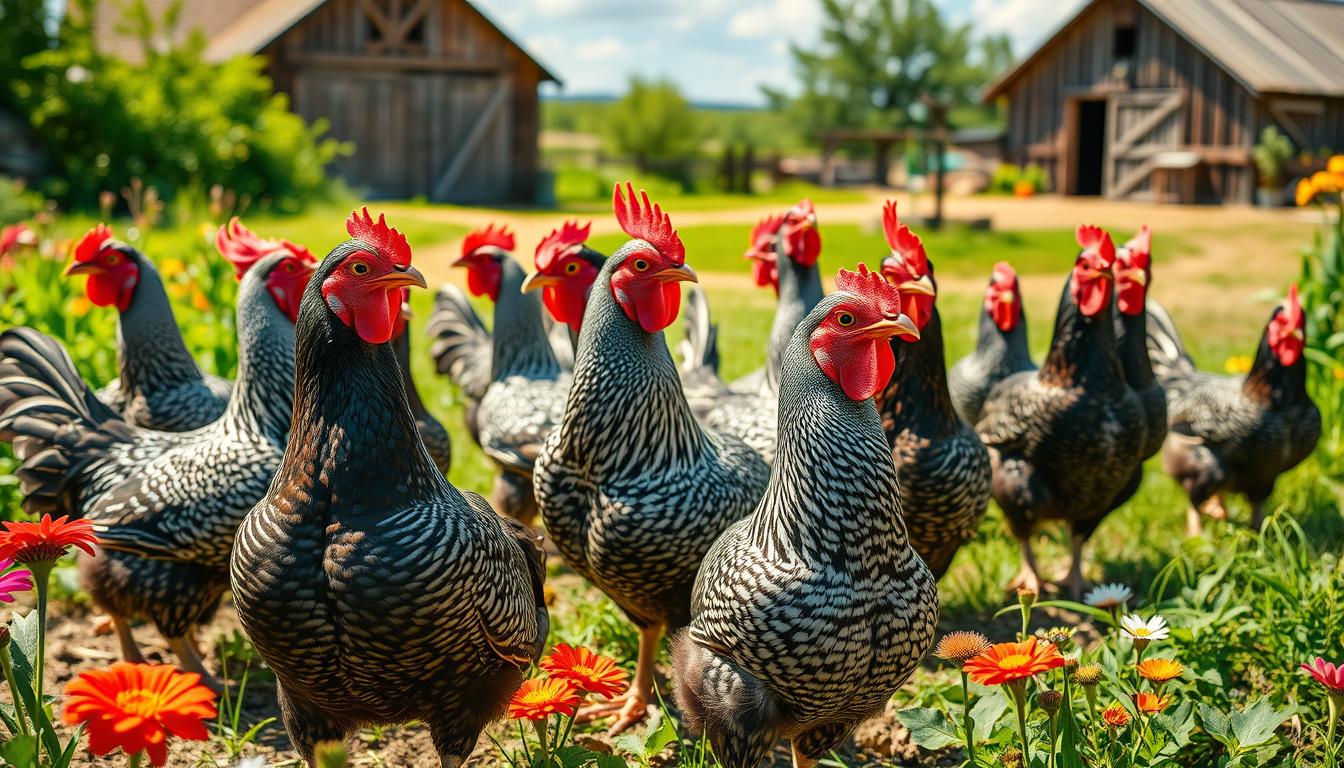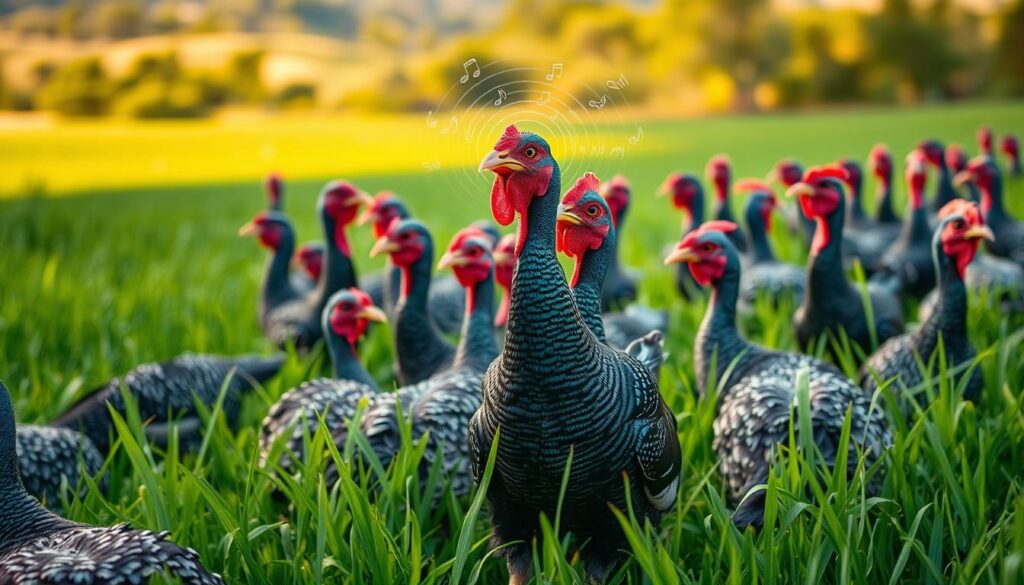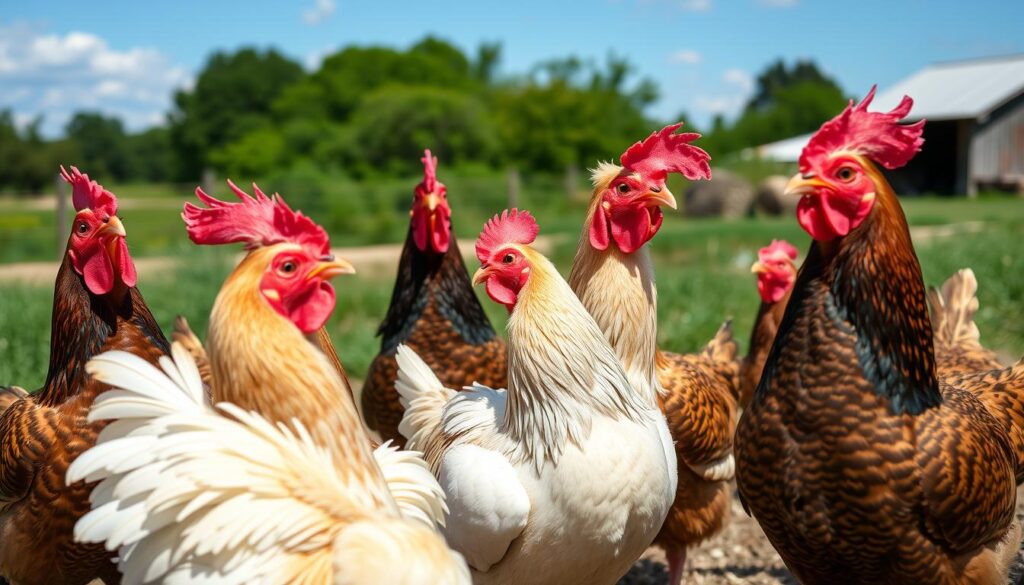Guinea Hen Sound: What Their Noisy Call Means

Did you know guinea fowl can make over 25 different sounds? Each sound has its own purpose. This shows how complex their communication is. It’s key for anyone who raises or watches guinea fowl to understand these sounds.
These sounds can warn of danger or help them talk while foraging. Exploring guinea fowl noises reveals the depth of their calls12.
Key Takeaways
- Guinea fowl produce over 25 unique vocalizations for various functions.
- Sounds play a critical role in signaling danger and social bonding.
- Mating behaviors are accompanied by distinct vocalizations from males and females.
- Understanding their calls enhances flock management and bird care.
- Auditory cues are essential for maintaining flock cohesion.
- Vocal changes can indicate health issues among guinea fowl.
Understanding Guinea Fowl Vocalizations
Guinea fowl sounds are key for talking within their group. These unique noises mean a lot, like warning of danger or showing friendship. Watching these calls helps us understand their lives and how they connect with each other.
The Purpose of Guinea Hen Sounds
Guinea hen sounds are very important. They help the group stay safe and together. Alarm calls tell them when danger is near, so they can act fast.
These sounds are essential for keeping everyone alert and informed. It’s like a warning system for the flock.
The Role of Sounds in Social Interaction
Guinea fowl talk a lot to each other. They use sounds to stay connected, especially when they’re moving or eating. These calls also help strengthen their friendships.
By listening to these sounds, we learn more about how they interact. It’s really interesting to see how they communicate3.
| Type of Vocalization | Purpose | Example |
|---|---|---|
| Alarm Call | Warns of Threats | High-pitched cries |
| Contact Call | Maintains Flock Cohesion | Soft clucks |
| Social Call | Reinforces Relationships | Chirpy sounds during grouping |
Listening to guinea hen calls helps us understand them better. It shows how important these sounds are in their daily lives4.
Common Types of Guinea Hen Calls
Guinea hens make different sounds to talk to each other. These sounds help them warn the group, stay together, and find mates. Let’s look at some common calls and why they matter.
Alarm Calls and Their Importance
Alarm calls are loud and sharp. They warn the group of danger. When you hear guinea fowl squawking, it means they’ve spotted something scary.
Contact Calls for Maintaining Flock Cohesion
Contact calls are soft and help guinea hens find each other. These calls keep the group together, especially when they’re exploring new places. They help guinea hens stay connected.
Mating Calls During Breeding Season
During breeding time, males make loud calls to attract females. Females respond with softer calls to show they’re interested. These calls help them find a mate and keep their species going.
| Type of Call | Purpose | Characteristics |
|---|---|---|
| Alarm Calls | Alert flock to danger | Sharp, loud cries |
| Contact Calls | Maintain flock cohesion | Soft, gentle notes |
| Mating Calls | Attract potential mates | Loud for males, soft for females |
Learning about guinea fowl calls helps you understand them better. For more info, check out this article about guineafowl5.
Guinea fowl are not just tasty and useful; they have their own way of talking. Their sounds show how social and adaptable they are. They play key roles in their environments.
Knowing their calls helps you care for guinea fowl better. It lets you create a better space for them. You’ll know when they’re warning you, looking for each other, or getting ready to mate67.
Guinea Hen Sound: What It Reveals About Their Behavior
Guinea hens communicate through sounds, giving us clues about their behavior and needs. Different sounds show their emotions and how they interact with each other. For example, certain calls mean they’re excited, scared, or upset, showing when they need extra care.
Behavioral Responses to Different Sounds
Guinea hens react differently to their calls. A high-pitched distress call means they’re scared or sensing danger. It’s important to manage the flock well in these moments. This way, you can create a safer and more supportive environment for them.
Studies show that Crested Guineafowl’s calls help keep the flock together and protect them from threats providing valuable information for conservation efforts8.
Understanding Distress Calls and Their Implications
Knowing the different clucks of guinea hens is key to managing your flock well. Distress calls, with their sudden and changing tones, mean they need safety right away. By understanding these sounds, you can respond better to dangers, keeping your birds safe and happy.
The emotional side of their sounds is also important. It shows they need comfort or protection from threats. So, listening to these sounds helps you manage your flock with more care and understanding9.
Interpreting the Meaning of Specific Guinea Hen Noises
Learning about guinea fowl sounds can deepen your bond with these birds. The “kek-kek-kek” alarm call is a key warning against dangers. It makes the flock change behavior quickly, showing their strong survival instinct.
The Significance of the “Kek-Kek-Kek” Alarm Call
The “kek-kek-kek” sound warns of threats, telling others to be cautious. It shows the flock’s watchfulness and highlights the role of sound in safety. Researchers have found different calls for various social functions10.
Understanding Food Calls and Social Signals
Food calls are another important guinea fowl noise. They tell others where to find food. This encourages everyone to forage together, building community. It’s key for their social structure and cooperation10.
These sounds, from warnings to food calls, help guinea fowl interact and stay well. Watching their sounds can tell you about their needs, health, and awareness. It helps you care for them better with informed choices.
The Role of Visual Cues in Guinea Fowl Communication
Visual cues are key to understanding guinea fowl communication. They work with their unique sounds. By watching their body language and feather displays, you learn more about guinea hen sounds and guinea fowl sounds. This helps you understand their messages better and respond properly.
Body Language and Its Connection to Sounds
Guinea fowls use body language with their sounds. A raised crest means they sense danger, matching their alarm calls. When they relax, it shows they feel safe and calm. These signs help you understand their guinea hen sound messages better.
Feather Displays as Complementary Signals
Feather displays are important for sending messages. When a guinea fowl fluffs up, it looks bigger and more powerful. This matches their loud sounds or shows who’s in charge. Watching these displays with guinea fowl sounds helps you get their social messages.
The Impact of Guinea Hen Sounds on Flock Dynamics

Guinea fowl sounds are more than just noise. They are key to their social lives. The calls help set up a pecking order in the group. Dominant birds often make louder calls to show who’s boss.
Vocalizations mark status in the group. A louder call means someone is in charge. For more on this, check out here11.
Establishing Hierarchies Through Vocalizations
Guinea fowl sounds keep the group in order. Different calls, like alarm and mating sounds, help set up a pecking order. They also keep the group together.
Listening to these calls can tell you a lot about your birds. Changes in their sounds might mean they’re stressed or uncomfortable11. It shows who’s in charge and who’s not.
Social Bonds Strengthened by Vocal Interactions
Guinea fowl calls also build friendships in the group. When they all make sounds together, it creates a sense of community. This helps them work together better, like when they’re foraging or scared.
Talking back to your guinea fowl might make your bond stronger1112. Paying attention to their sounds helps you understand their relationships better.
| Type of Vocalization | Purpose | Impact on Dynamics |
|---|---|---|
| Alarm Calls | Alerting flock to danger | Maintains group vigilance and cohesion |
| Contact Calls | Keeping flock together | Enhances social bonds and cooperation |
| Mating Calls | Attracting partners | Shapes breeding dynamics and hierarchy |
| Distress Calls | Signaling discomfort or danger | Indicates health issues, prompting interventions |
How Environmental Factors Influence Guinea Hen Calls
Environmental factors greatly affect how guinea hens make sounds. The presence of predators makes them more alert and loud. This helps the flock stay safe by warning each other of danger.
It’s important for breeders and fans to know these signs. This way, they can take better care of their birds.
Responses to Presence of Predators
Guinea fowl chatter gets louder when predators are around. Alarm calls are more common as they work together to warn each other. Predators like dogs, pigs, and snakes are big threats, causing 35.72% of losses13.
Knowing these calls helps you protect your guinea fowls. You can then take steps to keep them safe.
Changing Calls with Weather and Food Availability
Weather and food can change how guinea hens call. When food is scarce, they call more to find it. Bad weather can make them quieter.
Understanding these changes helps you manage your flock better. It’s key to keeping your guinea fowls happy and healthy.
| Environmental Factor | Impact on Vocalizations |
|---|---|
| Presence of Predators | Increased alarm calls and heightened alertness |
| Food Scarcity | More frequent food calls |
| Adverse Weather | Reduced vocal activity overall |
Pay attention to these sounds and what they mean. This will help you protect and care for your guinea fowl13.
Training Guinea Hens to Respond to Specific Sounds

Training guinea hens can make your relationship with them better. It also helps manage the flock well. By linking guinea hen vocalizations with actions, you can guide their behavior. This way, you can clearly tell them what to do during different activities.
Methods for Associating Sounds with Actions
Start by keeping guineas in a coop for 2 to 4 weeks. This lets them get used to their new home14. Use feeding times to teach them sounds, linking guinea fowl sounds with meals. Training young guinea keets is easier, making the process smoother15.
As training goes on, introduce one young guinea at a time outside. This avoids too much stimulation and lets them explore naturally14. When they learn to recognize sounds, managing the flock gets easier.
Enhancing Human-Guinea Interaction Through Training
Positive reinforcement builds a strong bond with your guinea hens. This bond is key since guineas love being with others15. When they learn your signals, they may even look forward to interacting with you. This improves their happiness and the atmosphere of your home.
Keeping guinea fowl with chickens can also help in training15. Over time, they’ll learn to respond to your sounds. This creates a peaceful and healthy environment for everyone.
The Importance of Listening to Guinea Hen Sounds
Listening to guinea hen sounds is key for their health and behavior. Their voices give clues about health issues and flock management. By listening, you can keep your guinea fowl safe and happy.
Detecting Health Issues Through Vocal Changes
Guinea fowl are loud, and their calls are easy to notice. If a bird stops talking, it might be sick or stressed. Watching for these changes helps you act fast to keep your birds healthy.
Adult guineas weigh 3-4 pounds for females and 4-5 pounds for males. This shows how important their care is16. By knowing their sounds, you can spot problems early and improve their lives.
Improving Flock Management by Understanding Sounds
Knowing what your guinea hens say helps you connect with them. For example, females make a special call that means something to them. Learning these sounds helps you manage their social life better16.
By understanding their noises, you can make their environment safer and more comfortable. This lets your hens live their best lives.
| Vocalization Type | Description | Health Implication |
|---|---|---|
| Alarm Calls | High-pitched and urgent | Possible threat or danger detected |
| Contact Calls | Soft and steady | Maintaining group cohesion |
| Mating Calls | Distinct two-syllable sound | Breeding behavior |
| Distress Calls | Frantic and loud | Indicates pain or serious concern |
Conclusion
Learning about guinea hen sounds helps us understand their way of talking. Knowing what their calls mean can make your bond with them stronger. For instance, alarm calls warn you of danger, while mating calls tell you it’s breeding time.
Also, knowing the importance of their sounds can make their home better. As they talk through different sounds, you can see how they act. This lets you create a great place for them to live, which is key for their health.
Learning about guinea fowl culture and meaning can also deepen your connection with them. These birds are good at keeping pests away and are great friends because of their special ways and sounds. To learn more about their cultural importance, check out this article on their symbolism and mythology17.
FAQ
What are the common sounds made by guinea hens?
How can I identify an alarm call from my guinea fowl?
What does a contact call signify among guinea fowl?
What are the implications of distress calls from guinea hens?
How do environmental factors affect guinea hen vocalizations?
Can I train my guinea hens to respond to specific sounds?
What role do visual cues play in guinea fowl communication?
How do guinea fowl vocalizations help establish social dynamics?
Why is it important to pay attention to guinea hen sounds?
Source Links
- https://www.backyardchickens.com/threads/anyone-speak-guinea-fowl-language.1616450/ – Anyone speak (Guinea) fowl language?
- https://www.skyechooks.com/guinea-fowl-skye/ – Decoding Guinea Fowl Communication: The Language of Calls
- https://ornithology.com/the-guineafowl/ – The Guineafowl – Ornithology
- https://gracelikestogarden.com/fowl/guinea-hen/ – Guinea hen – The sad sounds after a fox kills a guinea’s mate
- https://www.heritageacresmarket.com/guinea-fowl/ – Guinea Fowl: Everything You Need to Know About These Unique Birds
- https://www.feathersite.com/Poultry/Guineas/BRKGuineas.html – Guinea Fowl
- https://www.muranochickenfarm.com/2014/03/sexing-guinea-fowl.html – How to tell the sex of Guinea fowl by sound (It’s really easy!)
- https://www.ncbi.nlm.nih.gov/pmc/articles/PMC6396980/ – Spatial hearing ability of the pigmented guinea pig (Cavia porcellus): minimum audible angle and spatial release from masking in azimuth
- https://backyardpoultry.iamcountryside.com/chickens-101/buk-buk-buk-what-do-those-chicken-noises-mean/ – Chicken Noises: What Do They Mean? – Backyard Poultry
- https://www.payment.centralbank.gov.so/breakingnews/guinea-fowl-sounds-html.html – Understanding The Unique World Of Guinea Fowl Sounds
- https://ftp.7video.co.uk/cnn/understanding-the-unique-world-of-guinea-fowl-sounds.html – Understanding The Unique World Of Guinea Fowl Sounds
- https://www.cacklehatchery.com/what-kind-of-music-do-chickens-like/ – What Kind of Music Do Chickens Like? – Cackle Hatchery
- https://www.scirp.org/journal/paperinformation?paperid=128214 – Indigenous Breeding Practices in Guinea Fowl (Numida meleagris) as Influenced by Plumage Features in Northern Cameroon
- https://backyardpoultry.iamcountryside.com/poultry-101/training-free-range-guinea-fowl-101/ – Training Domestic Guinea Fowl 101 – Backyard Poultry
- https://thelittlegreenwagon.com/how-to-coop-train-guinea-fowl/ – How to Coop Train Guinea Fowl – The Little Green Wagon
- https://chickenscratchny.com/guinea-fowl/ – The Pros and Cons of Keeping Guinea Fowl
- https://poultry.extension.org/articles/poultry-management/raising-guinea-fowl-in-small-and-backyard-flocks/ – RAISING GUINEA FOWL IN SMALL AND BACKYARD FLOCKS


